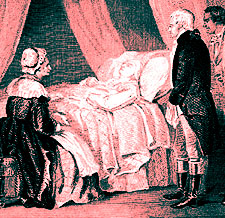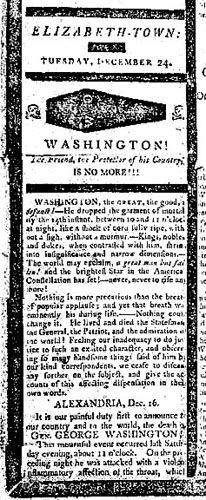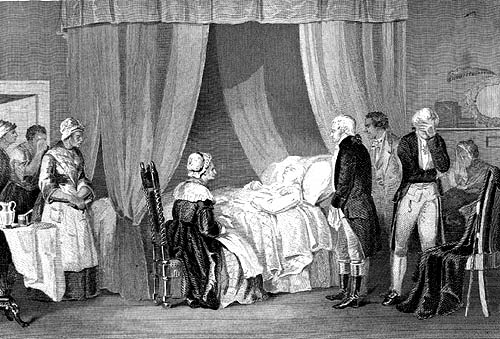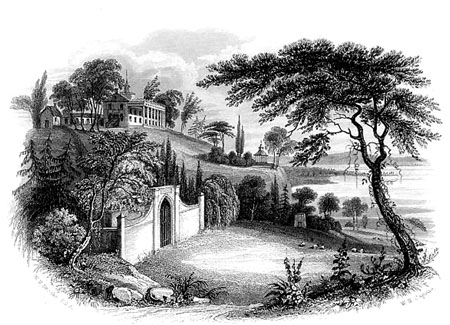|
FRESH STUFF DAILY |
|
|
||
|
|
||
|
|
||
|
SEE ALL SIGNED BOOKS by J. Dennis Robinson click here |
||
New Hampshire's Tobias Lear was on the scene during the long slow death of President George Washington at Mount Vernon. His detailed and carefully written account offers a detailed view of Washington's last moments. Not beloved of history, this writing may be secretary Tobias Lear's finest moment.
ABOUT THE AUTHOR The Last Illness and Death of General Washington On Thursday December 12th the General rode out to his farms about 10 o'clock, and did not return home 'till past three. Soon after he went out the weather became very bad . . .: When he came in I carried some letters for him to frank, intending to send them to the Post Office in the Evening. He franked the letters; but said the weather was too bad to send a servant to the Post Office that evening. I observed to him that he had got wet; he said no his great coat had kept himdry; but his neck appeared to be wet and the snow was hanging upon his hair. He came to dinner (which had been waiting for him) without changing his dress. In the evening he appeared as well as usual. A heavy fall of snow took place on Friday, which prevented the General from riding out as usual. He had taken cold (undoubtedly from being so much exposed the day before) and complained of a sore throat: However he went out in the afternoon into the Ground between the House and the River to mark some trees which were to be cut down in the improvement of that spot. He had a hoarseness, which increased in the evening; but he made light of it. In the evening the papers were brought from the Post offfice, and he sat in the Parlour with Mrs. Washington & myself reading them until about nine o'clock. When Mrs. W went up to Mrs. Lewis' room, who was confined in child bed, and left the General & myself reading the papers. He was very chearful and when he met with anything interesting or entertaining, he read it aloud as well as his hoarseness would permit him. He requested me to read to him the debates of the Virginia Assembly on the election of a senator and a governor; and on hearing of Mr. Madison's observations respecting Mr. Monroe, he was much affected and spoke with some degree of asperity on the subject, which I endeavoured to moderate, as I always did on the such occasions. On his retiring I observed to him that he had better take something to remove his cold; he answered no; "you know I never take anything for a cold. Let it go as it came." A Simple Cold
In the meantime, before Dr. Craik arrived, Mrs. Washington desired of me to send for Dr. Brown of Port Tobacco whom Dr. Craik had recommended to be called if any case should occur that was seriously alarming. I dispatched a messenger (Cyrus) immediately for Dr. Brown (between 8 and 9 o'clock). Dr. Craik came in soon after, upon examining the General, he put a blister of Cantharides on the throat, took some more blood from him and some Vinegar and hot water for him to inhale the steam, which he did, but in attempting to use this gargle he almost suffocated. When the gargle came from the throat some phlegm followed it, and he attempted to cough, which the Doctor encourage him to do as much as possible; but he could only attempt it. About 11 o'clock Dr. Craik requested that Dr. Dick might be sent for, as he feared Dr. Brown might not come in time. A messenger was accordingly dispatched for him. About this time the General was bled again. No effect, however, was produced by it. A Blister was administered about 12 o'clock, which produced an evacuation.... Doctor Dick came in about 3 o'clock, and Dr. Brown arrived soon after. Upon Dr. Dick's seeing and consulting a few minutes with Dr. Craik, he was bled again. The blood came very slow, was thick and did not produce any symptoms of fainting. Dr. Brown came into the Chamber soon after; and upon feeling the General's pulse, the physicians went out together. Dr. Craik returned soon after. The General could now swallow a little. Calomel and tartar em were administered....
"I Feel Myself Going." About half past 4 O'clock he desired me to call Mrs. Washington to his bedside, when he requested her to go down into his room, and take from his desk two wills she would find there, and bring them to him, which she did. Upon looking at them he gave her one which he observed was useless, as being suppressed by the other, and desired her to burn it, which she did. After this was done I returned to his bedside and took his hand. He said to me, "I find I am going, my breath cannot last long; I believed from the first that the disorder would prove fatal. Do you arrange & record all my late military letters & papers arrange my accounts and settle my books, as you know more about them than anyone else. Let Mr. Rawlins finish recording my other letters which he has begun." I told him this would be done. In the course of the afternoon he appeared to be in great pain & distress, from the difficulty of breathing, & frequently changed his posture in the bed. On these occasions I lay upon the bed & endeavoured to raise him, & turn him with as much ease as possible. He appeared penetrated with gratitude for my attentions, & often said I am afraid I shall fatigue you too much; and upon my assuring him that I could feel nothing but a wish to give him some ease; he replied, "Well, it is a debt we must pay to each other, and I hope when you want aid of this kind you will find it." About 5 O'clock Dr. Craik came again into the Room & upon going to the bedside, the General said to him, "Doctor, I die hard; but I am not afraid to go, I believed from my first attack, that I should not survive it; my breath cannot last long. The Doctor pressed his hand but did not utter a word. He retired from the bed side & sat by the fire absorbed in grief. Between 5 & 6 O'clock Dr. Dick & Dr. Brown came into the room, and with Dr. Craik went to the bed; when Dr Craik asked him if he could sit up in bed. He held out his hand & I raised him up. He then said to the Physicians, "I feel myself going, I thank you for your attentions; but I pray you take no more trouble about me, let me go off quietly; I cannot last long." They found that all which had been done was without effect; he laid down again, and all retired, excepting Dr. Craik. He continued in the same situation, uneasy & restless; but without complaining; frequently asking what hour it was. When I helped him move at this time he did not speak; but looked at me with strong expressions of gratitude. About 8 o'clock the Physicians came again into the room & applied blisters and cataplasms of wheat bran to his legs & feet; after which they went out (except for Dr. Craik) without a ray of hope. I went out about this time & wrote a line to Mr. Law & Mr. Peters, requesting them to come with their wives (Mrs. Washington's granddaughters) as soon as possible to Mount Vernon. About 10 o'clock he made several efforts to speak to me before he could affect it, at length he said, "I am just going! Have me decently buried; and do not let my body to be put into the vault less than three days after I am dead. " I bowed assent, for I could not speak. He then looked at me again and said, "Do you understand me?" I replied Yes! " 'Tis well!" said he. About 10 minutes before he expired (which was between 10 & 11 o'clock) he breating [sic] became easier; he lay quietly; he withdrew his hand from mine, and felt his own pulse. I saw his countenance changed I spoke to Dr. Craik who sat by the fire; he came to the bed side. The General's hand fell from his wrist I took it in mine and put it into my bosom. Dr. Craik put his hand over his Eyes and he expired without a struggle or sigh. While we were fixed in silent grief, Mrs. Washington (who was sitting at the foot of the bed) asked, with a firm & collected voice, Is he gone? I could not speak; but held up my hand as a signal that he was no more. 'Tis well said she in the same voice All is now over, I shall soon follow him! I have no more trials to pass through. Excerpted from
Please visit these SeacoastNH.com ad partners.
News about Portsmouth from Fosters.com |
| Friday, April 19, 2024 |


|
Copyright ® 1996-2020 SeacoastNH.com. All rights reserved. Privacy Statement
Site maintained by ad-cetera graphics

 Link Free or Die
Link Free or Die




 Born in the Puddle Dock neighborhood of Portsmouth, NH,
Born in the Puddle Dock neighborhood of Portsmouth, NH,  Between two and three o'clock on Saturday morning he awoke Mrs. Washington, and told her he was very unwell, and had an ague. She observed that he could scarcely speak and breathed with difficulty; and would have got up to see a servant; but he would not permit her lest she take cold. As soon as the sun appeared, the Woman (Caroline) went into the Room to make a fire, and Mrs. Washington sent her immediately to call me. I got up, put on my clothes as quickly as possible and went to his chamber. Mrs. Washington was then up, and related to me his being taken ill as before stated. I found the General breathing with difficulty, and hardly able to utter a word intelligibly. He desired that Mr Rawlins (One of the overseers) might be sent for to bleed him before the Doctors could arrive. I dispatched a Servant immediately for Rawlins, and another for Dr. Craik, and returned again to the General's Chambr, where I found him in the same situation as I had left him -A mixture of Molasses, vinegar & butter was prepared to try its effects in the throat; but he could not swallow a drop; whenever he attempted it he appeared to be distressed, convulsed and almost suffocated. Rawlins came in soon after Sunrise, and prepared to bleed him. When the Arm was ready the General observing that Rawlins appeared to be agitated said, as well as he could speak "Don't be afraid." And after the incision was made, he observed "The Orifice is not large enough. However the blood ran pretty freely. Mrs. Washington not knowing whether bleeding was proper or not in the General's situation, begged that not much be taken from him lest it should be injurious, and desired me to stop it; but when I was about to untie the string, the General put up his hand to prevent it, and as soon as he could speak, said "more, more." Mrs. Washington being still very uneasy lest too much blood should be taken, it was stopt after about half a pint. Finding that no relief was obtained from bleeding, and that nothing would go down the throat, I proposed bathing it externally, with salve latola, which was done; and in the operation, which was done with hand, in the gentlest manner, he observed, " 'tis very sore." A piece of flannel dip'd in salve-latola was put around his neck, and his feet bathed in warm waters; but without affording any relief.
Between two and three o'clock on Saturday morning he awoke Mrs. Washington, and told her he was very unwell, and had an ague. She observed that he could scarcely speak and breathed with difficulty; and would have got up to see a servant; but he would not permit her lest she take cold. As soon as the sun appeared, the Woman (Caroline) went into the Room to make a fire, and Mrs. Washington sent her immediately to call me. I got up, put on my clothes as quickly as possible and went to his chamber. Mrs. Washington was then up, and related to me his being taken ill as before stated. I found the General breathing with difficulty, and hardly able to utter a word intelligibly. He desired that Mr Rawlins (One of the overseers) might be sent for to bleed him before the Doctors could arrive. I dispatched a Servant immediately for Rawlins, and another for Dr. Craik, and returned again to the General's Chambr, where I found him in the same situation as I had left him -A mixture of Molasses, vinegar & butter was prepared to try its effects in the throat; but he could not swallow a drop; whenever he attempted it he appeared to be distressed, convulsed and almost suffocated. Rawlins came in soon after Sunrise, and prepared to bleed him. When the Arm was ready the General observing that Rawlins appeared to be agitated said, as well as he could speak "Don't be afraid." And after the incision was made, he observed "The Orifice is not large enough. However the blood ran pretty freely. Mrs. Washington not knowing whether bleeding was proper or not in the General's situation, begged that not much be taken from him lest it should be injurious, and desired me to stop it; but when I was about to untie the string, the General put up his hand to prevent it, and as soon as he could speak, said "more, more." Mrs. Washington being still very uneasy lest too much blood should be taken, it was stopt after about half a pint. Finding that no relief was obtained from bleeding, and that nothing would go down the throat, I proposed bathing it externally, with salve latola, which was done; and in the operation, which was done with hand, in the gentlest manner, he observed, " 'tis very sore." A piece of flannel dip'd in salve-latola was put around his neck, and his feet bathed in warm waters; but without affording any relief.
















